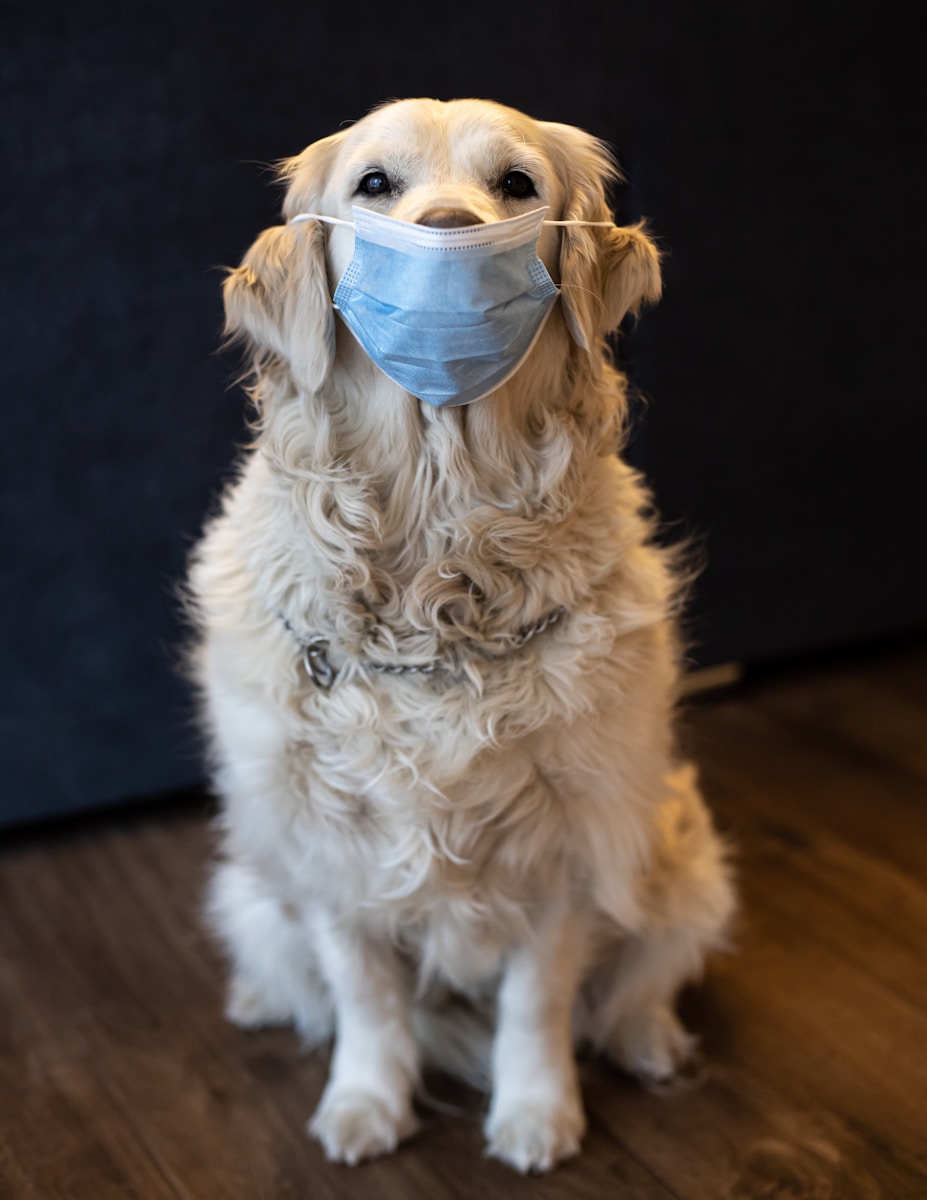Have you asked yourself, ‘Why does my dog keep coughing?’
When your beloved canine companion starts coughing, it can be alarming. While an occasional cough might be a natural response to minor irritations, persistent coughing in dogs often signals an underlying health issue that requires attention. Understanding the difference between a harmless cough and one that warrants a vet visit can help you make informed decisions about your dog’s health.
Dog coughing can stem from various causes, ranging from simple throat irritation to serious conditions like heart disease or respiratory infections. Some causes are highly contagious and spread easily among dogs, while others may be life-threatening conditions requiring immediate veterinary care. The key lies in recognizing the type of cough, accompanying symptoms, and knowing when your coughing dog needs professional evaluation.
This comprehensive guide will help you identify common reasons why your dog is coughing, recognize warning signs that indicate a medical emergency, and understand when it’s time to contact your emergency vet or schedule a routine veterinary appointment.
Understanding Different Types of Dog Coughs
Not all coughs sound the same, and the type of cough your dog produces can provide valuable clues about the underlying cause. A dry, hacking cough differs significantly from a wet, productive cough, and each may point to different respiratory conditions.
A honking cough that sounds like a goose honk often indicates tracheal collapse, particularly common in small breed dogs. This distinctive sound occurs when the tracheal rings weaken and the airway narrows. Meanwhile, a wet cough that brings up phlegm or mucus typically suggests fluid buildup in the lungs or respiratory tract, which could indicate heart failure or pneumonia.
Pay attention to when your dog coughs most frequently. Does it happen after exercise, during excitement, or while lying down? These patterns can help your veterinarian determine the root cause and develop an appropriate treatment plan.
Kennel Cough: The Most Common Culprit
Kennel cough remains one of the most frequent causes of coughing in dogs. This highly contagious respiratory infection affects the upper respiratory tract and spreads rapidly in environments where dogs congregate, such as boarding facilities, dog parks, or grooming salons.
The classic kennel cough presents as a persistent, dry, hacking cough that sounds like your dog has something stuck in their throat. Dogs with kennel cough may also experience nasal discharge, sneezing, and mild lethargy. Most dogs with kennel cough continue eating and remain alert, though the constant coughing can be distressing for pet parents.
While kennel cough often resolves on its own within one to three weeks, veterinary treatment can help speed recovery and prevent secondary infections. Your veterinarian may prescribe cough suppressants or antibiotics if bacterial complications develop. Keep your dog isolated from other dogs until the cough resolves to prevent spreading this contagious condition.
Heart Disease and Heart Failure
Heart disease represents one of the more serious causes of chronic cough in dogs. As the heart becomes less efficient at pumping blood, fluid can accumulate in the lungs, leading to a persistent cough that’s often worse at night or when lying down.
Dogs with heart-related coughing may also show other symptoms including difficulty breathing, reduced appetite, fatigue, and exercise intolerance. The cough associated with heart failure typically sounds wet or moist and may worsen over time without proper veterinary treatment.
Certain breeds face higher risks for heart conditions. Small breeds like Cavalier King Charles Spaniels are prone to mitral valve disease, while larger breeds may develop dilated cardiomyopathy. Early detection through regular veterinary checkups can help manage heart disease before it progresses to heart failure.
Respiratory Infections and Canine Influenza
Various respiratory infections can cause persistent coughing in dogs. Canine influenza, bacterial pneumonia, and viral infections all affect the respiratory tract differently but share coughing as a primary symptom.
Canine influenza produces symptoms similar to human flu, including coughing, nasal discharge, fever, and lethargy. This viral infection spreads easily among dogs and requires supportive care while the immune system fights the virus. Most dogs recover fully with proper rest and veterinary support.
Bacterial respiratory infections may require antibiotic treatment and often develop as secondary complications from viral infections or other underlying conditions. Young puppies and senior dogs face higher risks for developing serious complications from respiratory infections.
Tracheal Collapse: When Airways Weaken
Tracheal collapse affects the windpipe structure, causing the cartilage rings that keep the trachea open to weaken and collapse. This condition produces a distinctive honking cough that sounds like a goose call, particularly during excitement, exercise, or when pulling against a collar.
Small and toy breed dogs, including Yorkshire Terriers, Pomeranians, and Chihuahuas, are most susceptible to tracheal collapse. Obese dogs face increased risks as excess weight puts additional pressure on the respiratory system.
Management of tracheal collapse focuses on weight control, avoiding respiratory irritants like cigarette smoke, using harnesses instead of collars, and medications to reduce inflammation and suppress coughing. Severe cases may require surgical intervention to support the collapsed trachea.
Heartworm Disease: A Preventable Threat
Heartworm disease develops when infected mosquitoes transmit heartworm larvae to dogs. These parasites mature in the heart and pulmonary arteries, causing coughing, difficulty breathing, and eventually heart failure if left untreated.
Dogs with heartworm disease may initially show subtle symptoms like occasional cough and reduced exercise tolerance. As the disease progresses, coughing becomes more frequent and severe, accompanied by trouble breathing and lethargy.
Prevention remains the best approach for heartworm disease. Monthly heartworm preventatives are highly effective and much safer than treating established infections. All dogs should receive year-round heartworm prevention regardless of geographic location.
Chronic Bronchitis and Lung Problems
Chronic bronchitis causes persistent inflammation of the airways, leading to ongoing cough that may last months or years. This condition often affects middle-aged to senior dogs and may be triggered by environmental allergens, irritants, or underlying respiratory conditions.
Dogs with chronic bronchitis typically produce a dry, hacking cough that may worsen with exercise or excitement. Unlike acute conditions, chronic bronchitis requires long-term management with anti-inflammatory medications and environmental modifications.
Other lung problems, including pneumonia and pulmonary hypertension, can also cause persistent coughing. These conditions often require specialized diagnostic testing and targeted treatment approaches.
Foreign Objects and Throat Irritation
Sometimes dogs inhale or swallow foreign objects that become lodged in the respiratory tract or the dog’s throat. Grass seeds, small toys, food particles, or other debris can cause sudden onset coughing as the body attempts to expel the foreign material.
If you suspect your dog has inhaled or swallowed a foreign object, this constitutes a medical emergency requiring immediate veterinary attention. Dogs may show signs of respiratory distress, excessive drooling, pawing at the mouth, or panic.
Never attempt to remove foreign objects yourself, as this can push the item deeper or cause additional injury. Emergency veterinary intervention is necessary to safely remove foreign bodies from the respiratory system.

When Dog Coughing Becomes an Emergency
Recognizing when coughing represents a medical emergency can be life-saving. Certain symptoms indicate your dog needs immediate emergency clinic evaluation rather than waiting for a routine vet visit.
Seek emergency veterinary care if your dog shows blue gums or tongue, severe difficulty breathing, collapse, or signs of respiratory distress. These symptoms suggest your dog isn’t getting enough oxygen and requires immediate intervention.
Other emergency warning signs include persistent retching or gagging without producing anything, excessive drooling combined with difficulty swallowing, or sudden onset of severe coughing following potential foreign object ingestion. Time becomes critical in these situations.
Prevention and Long-Term Management
Maintaining your dog’s overall health provides the best defense against respiratory problems. Keep your dog at a healthy weight to reduce stress on the respiratory and cardiovascular systems. Obesity significantly increases risks for tracheal collapse, heart disease, and respiratory complications.
Avoid exposing your dog to potential irritants like cigarette smoke, strong cleaning chemicals, or dusty environments. These substances can trigger coughing episodes and worsen existing respiratory conditions.
Regular veterinary checkups allow for early detection of heart disease, respiratory infections, and other conditions before they become serious problems. Annual heartworm testing and year-round prevention protect against this preventable but serious disease.
Stay current on vaccinations, including those that help prevent kennel cough. While vaccines don’t prevent all strains of kennel cough, they significantly reduce the risk and severity of infection.
Working With Your Veterinarian
When you notice persistent coughing, document the details to help your veterinarian make an accurate diagnosis. Note when the coughing occurs, what it sounds like, and any other symptoms you observe. Video recordings of coughing episodes can be particularly helpful during veterinary consultations.
Be prepared to discuss your dog’s recent activities, exposure to other dogs, changes in environment, and any other symptoms. This information helps your veterinarian determine whether the cough represents a minor irritation or signals a more serious underlying condition.
Don’t hesitate to seek veterinary care for persistent coughing. Early intervention often leads to better outcomes and can prevent minor issues from developing into serious health problems.
Snouts and Stouts Indoor Dog Park and Bar would be great for your pups to let all that energy out!

Helpful Links and Resources
Here are seven helpful links and resources to better understand dog coughing and care for your furry friend:
American Kennel Club – Kennel Cough in Dogs
Learn more about symptoms, treatment, and prevention of kennel cough.
ASPCA – Common Dog Health Problems
A great resource outlining common health issues in dogs, including coughing.
VCA Animal Hospitals – Coughing in Dogs
Understand the different causes of coughing in dogs and when to seek professional advice.
Get informed about canine flu, a potential cause of persistent coughing in dogs.
PetMD – Signs Your Dog Needs to See a Vet
Recognize when your dog’s symptoms require urgent veterinary attention.
Tips and advice for keeping your dog healthy and happy.
Veterinary Partner – Canine Respiratory Health
Explore in-depth veterinary articles and guides related to respiratory health in dogs.
These resources can further support your understanding of dog coughing and general care, helping you keep your pet healthy and comfortable.
Taking Action for Your Dog’s Respiratory Health | Why Does My Dog Keep Coughing?
Dog coughing serves as an important health indicator that shouldn’t be ignored. While occasional coughs may represent normal responses to minor irritations, persistent or severe coughing often signals underlying conditions requiring professional attention.
Understanding the various causes of coughing in dogs empowers you to make informed decisions about your pet’s care. From highly contagious kennel cough to serious conditions like heart disease and tracheal collapse, each cause requires different approaches to treatment and management.
Monitor your dog’s symptoms closely and maintain regular veterinary care to catch potential problems early. When in doubt, consult with your veterinarian rather than waiting to see if symptoms resolve on their own. Your vigilance and prompt action can make a significant difference in your dog’s health outcomes and quality of life.




